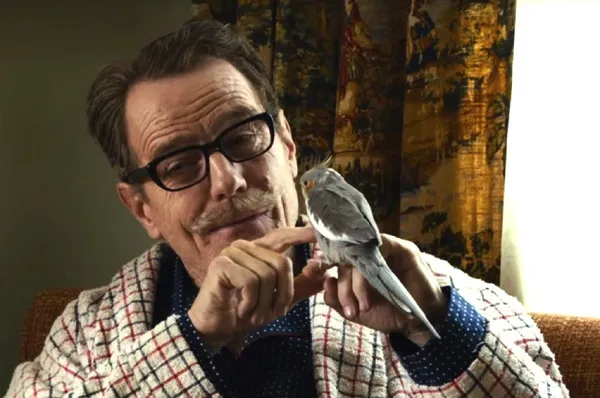 |
| Bryan Cranston as Dalton Trumbo with Sam Jackson |
Following the Trumbo première attended by Bryan Cranston, Helen Mirren, Diane Lane, Michael Stuhlbarg and Louis C.K., as well as Dalton Trumbo's daughters Niki Trumbo and Mitzi Trumbo, director Jay Roach mapped out for me the links between birds, Edward G. Robinson's art collection, Otto Preminger, Kirk Douglas and Spartacus; USC, Edward Dmytryk and Lee Grant; Roman Holiday, 30 Seconds Over Tokyo and A Guy Named Joe; Kitty Foyle, Ginger Rogers' mother, Hedda Hopper's hats and horse manure; Bertolt Brecht's Hollywood poem and Myrna Loy's radio show.
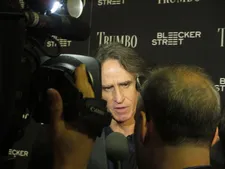 |
| Trumbo director Jay Roach: "I wanted to buy Bryan Cranston that bird …" Photo: Anne-Katrin Titze |
While Taylor Hackford, Dana Delany, Kathleen Turner, Elle MacPherson, Tony Bennett, Susan Crow, Julie Taymor, Robert Wuhl, Kate Lardner, Ruben Blades, Tim Daly, Trumbo screenwriter John McNamara, producers Michael London, Kevin Kelly Brown, Monica Levinson, Shivani Rawat, Nimitt Mankand, Bleecker Street CEO Andrew Karpen, Chuck Scarborough, Jean Shafiroff and the stars of the film celebrated, Jay and I found a quiet corner at Villagio on Central Park South.
With my favorite scene from Roman Holiday of Gregory Peck and Audrey Hepburn at the Roman Mouth of Truth, interspersed between episodes of a private and professional life, Trumbo is a nimble, multi-faceted portrait of the blacklisted Hollywood screenwriter. Bryan Cranston gives a wonderfully spirited performance and when his Trumbo tells the fictional John Wayne (David James Elliott) early on that "we both have the right to be wrong," the sails are being set into the future.
Diane Lane as Trumbo's wife Cleo has a lot to handle and does so with poise and humor - especially when she balances a glass on her head and juggles with several more, as a fitting metaphor for the lightness, depth, and dangers she confronts. For me, it is a clever companion piece to Brian Aherne's glass balancing adroitness in Alfred Hitchcock's I Confess.
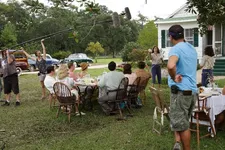 |
| Diane Lane glass juggling on set as Cleo Trumbo Photo: Jay Roach |
Anne-Katrin Titze: I loved the birds. Did Dalton Trumbo actually have birds?
Jay Roach: You saw the pictures in the credits of him with the bird on his head. His daughter would find a wounded bird and he would [take it in] and then Kirk Douglas recognised that he loved birds so much, so he bought him that parrot - I think it's a cockatoo [it's a cockatiel]. And he named it Sam Jackson, which was the pseudonym. Sam Jackson was the name that Dalton Trumbo used to write Spartacus.
So when Otto Preminger (Christian Berkel) says, "Oh, it's a distraction", he [Trumbo] says "no, he wrote Spartacus." He is referring to his own pseudonym. Kirk knew that he loved birds and it was a way to win him over. He carried that bird around and he really would let it kiss his lips. And Bryan, on the set - the bird would be chewing on his ear.
AKT: They got along really well, it seems.
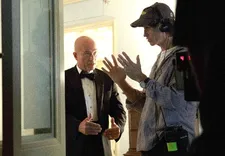 |
| Jay Roach directing Otto Preminger (Christian Berkel) Photo: Jay Roach |
JR: They got along really well. I wanted to buy Bryan Cranston that bird but someone said no, he doesn't want anything that traps him at home. Because I would have bought it for him in a second.
AKT: The birds [we see cockatiel Sam Jackson and a rescued pigeon to be taken care of] pose such a lovely antidote to Edward G. Robinson's art collection, the "dead" artworks on his walls.
JR: Interesting, whoa, interesting. I like the analogy. These are alive things and he was rescuing them. They were often wounded birds.
AKT: As a wildlife rehabilitator, I've rescued quite a few birds myself. That's why I'm asking.
JR: No kidding? A bird fell out of a tree and Trumbo nursed it back to health. His daughter Mitzi, who is here tonight, you should ask her about it. He was obsessed with birds and he often was rescuing them and nurturing them and rehabilitating them back to health.
![Spartacus poster at MoMA: "Kirk [Douglas] knew that he [Trumbo] loved birds …"](/images/newsite/Spartacus poster at MoMA_225.webp) |
| Spartacus poster at MoMA: "Kirk [Douglas] knew that he [Trumbo] loved birds …" Photo: Anne-Katrin Titze |
AKT: You could also link this to the boy and his bull [in the Oscar winning The Brave One]?
JR: It's funny, I never made this connection before, but I grew up loving stories like Old Yeller or even modern versions, My Dog Skip. I had a connection to animals when I was a kid partly because my dad was a hunter and he was so "animals are animals," and I always had a connection. And I think he [Trumbo] bonded with his children over these connections to these animals. It humanizes him, right?
AKT: It does. And there is the horse as well. Great looking horse. Did you choose the horse as well?
JR: Oh, yeah. It was a kind of misted horse that was all spotted. The only thing that I regret was, we had scripted that day to shoot a shot of his fancy shoes walking next to the hooves of the horse and the manure. And I ran out of daylight and I couldn't do it. So I had to just stay in a wide shot.
AKT: And then you have, of course, Hedda Hopper (Helen Mirren), who I never new was such a vicious, vicious woman.
JR: She was a zealous person. She was principled in her way. She believed totalitarian communism was a genuine threat. She wasn't cynical about it, I don't think.
AKT: Did her son return from the war?
JR: Oh, yeah. He was an actor, I think, or something. But she believed her own industry was being corrupted by these infiltrators who were going to hypnotize America through mainstream movies. Can you imagine the guy who wrote Roman Holiday, one of the most beautiful mainstream [films] and he had also written 30 Seconds Over Tokyo, which is a pro-American war film and A Guy Named Joe, which is pro-American film [with Spencer Tracy and Irene Dunne]? That she gets to now convince her 30 million readers that he was an enemy of the state! Imagine the power of propaganda through a weird lady with funny hats.
 |
| Dalton Trumbo wrote Johnny Got His Gun and screenplays for Roman Holiday and Exodus Photo: Anne-Katrin Titze |
AKT: Actually, you made her look beautiful. The costumes are good.
JR: Well, it's Helen Mirren. Ha, ha. She was beautiful, though. She was an actress. She was courted by studio heads like Louis B. Mayer.
AKT: That was based on fact?
JR: That was real. She was charming and sexy in her own weird way.
AKT: I hadn't been aware that Trumbo wrote Kitty Foyle. Ginger Rogers' breakthrough dramatic role.
JR: All before '47. That's a whole story there. Because her mother, Ginger Rogers' mother became a very rabid right-wing red-baiter and was part of the same organization, the MPA, that Hedda Hopper was. She always accused these guys of hypnotising her daughter and indoctrinating them into their cult of Communism.
AKT: You have some photos in the background, one with Fred Astaire. There is also one with Bryan standing in for Trumbo with Katharine Hepburn. What did they work on together?
(1)_225.webp) |
| Dalton Trumbo (Bryan Cranston) at the House Un-American Activities |
JR: Yeah, Katharine Hepburn. I can't remember what film they might have worked on together.
AKT: Wasn't she in A Bill of Divorcement? [I was wrong - Hepburn was in the 1932 film Bill of Divorcement. Trumbo wrote the screenplay of the 1940 film of the same title, starring Maureen O'Hara.]
JR: When that picture was taken, I can't remember what film they might have worked on together. He worked with so many actors, oftentimes without credit. So I'm not sure which film that was.
AKT: In the end credits you have the famous shot with Bertolt Brecht behind him. I asked Trumbo's daughters [Niki and Mitzi] earlier if he ever came to their house. Do you know how well they knew each other?
JR: I am not sure, but he was one of the Hollywood 19. He was one of the "Unfriendly 19". He ended up not testifying but he went back to Europe in the middle of all this whole chaos, but he was definitely blacklisted.
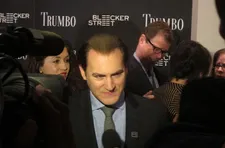 |
| Michael Stuhlbarg on the red carpet Photo: Anne-Katrin Titze |
AKT: There is this fantastic poem he wrote about Hollywood in which he says that in Hollywood you don't need Heaven and Hell. You only have Heaven - for the rich it is heaven and for the poor it is Hell.
JR: Oh, I love that! Wow, what an incredible poem. I have to find this. That is so beautiful. Imagine the hell. We spoke to Walter Bernstein who wrote The Front and many other films, including, what I didn't know - that he was an uncredited writer on The Magnificent Seven. When he was blacklisted, his own friends would cross the street to avoid looking at his eyes.
AKT: You have Edward G. Robinson (Michael Stuhlbarg) say something along those lines in Trumbo.
JR: Yeah, it's a similar story. Lee Grant, whom we met yesterday, lost her career from age 24 to age 36. She's an incredible actress and she was so compelling in Shampoo and films I saw her in later. An actress's prime years are 24 to 36.
AKT: The writer can better afford it, the actor can't.
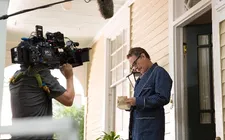 |
| Bryan Cranston on the set Photo: Jay Roach |
JR: They can't use a pseudonym or a front. They are stuck. Same with directors, by the way. One of my directing teachers at USC was Edward Dmytryk, who was one of the Hollywood 10. He had already been super successful as a filmmaker for movies like Crossfire which is a very progressive, anti anti-Semitic film. He was blacklisted, he testified but didn't name names. He goes to jail, comes out of jail, and to rehabilitate his career because he can't hide behind pseudonyms, as writers can, he names names. And he named, I'm told, Lee Grant's husband. And so that man becomes blacklisted. She's already been blacklisted for giving a eulogy at a blacklisted writer's funeral. She's not a Communist, but guilt by association.
So Edward Dmytryk, my directing teacher who was a wonderful teacher, even in film school, he was ostracized by the left for naming names. And he was tortured much the same way Edward G. Robinson's character is in our film. In a way, it's therapy to just try to understand this horrible thing that you can't reconcile and it torments you. In another way, it's cathartic because by hashing it out, you begin to understand and empathize with what everyone went through. I love this speech at the end. Dalton Trumbo says in the film, there's no villains and there's no heroes.
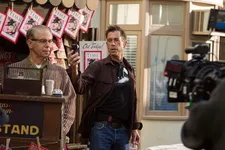 |
| Cinematographer Jim Denault on the Trumbo set Photo: Jay Roach |
AKT: And only victims.
JR: Yeah. And he is vilified for saying that. He didn't want revenge. And his own wife was angry with him for being forgiving. That was moving to me because one likes to think one would go to the wiser place where revenge was not the point.
AKT: These are the points where we can still very much relate in 2015.
JR: I think it relates to us. I always say it's as much about 2015 as it is about 1947. Politicians still, to make their own place as politicians, use fear. In the modern world, it's fear of terrorism, it's no longer totalitarian communism. Politicians use terrorism, which is a real threat obviously, to accuse people of being friendly to terrorists. They use phrases of fear the same way they used the red scare to attack anybody with any progressive ideas.
I feel like it's a pattern in history and it repeats itself over and over. I feel it's a beautiful parable about today… Look at the pundits. People who are using fear. Fear of immigrants, for example, fear of the outsider - that's a common tool in the propagandist's toolbox to make us conform to agendas that are not good for our interests. I was listening to a radio show that came out right after these trials, these inquisitions and Myrna Loy, one of the great actresses of all time…
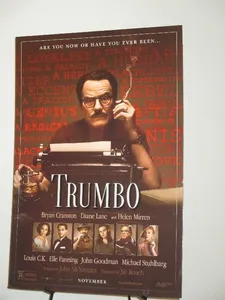 |
| Trumbo US poster at the Museum of Modern Art Photo: Anne-Katrin Titze |
AKT: I love Myrna Loy …
JR: Myrna Loy said "this is one of the most un-American processes of all time and it's called the House Un-American Activities." And I thought, that's it - she said they're slinging red paint, they're accusing people of just knowing people who know people. It was a radio show called Hollywood Fights Back. It came out November 2, 1947. A few days after the committee dissolved itself because they got nowhere and she said this to describe the pointlessness and the lunacy of what the House Un-American Activities Committee had done.
AKT: The real ending of all this wasn't until 1975?
JR: 1970 was the ending. He [Trumbo] wins the Laurel Award in 1970. We say the HUAC existed until '75. There were still people asking for loyalty oaths. It's not an unusual thing in this country for evil to use the smear of calling someone a Socialist or a Communist. It's a standard go-to tool.
AKT: We just have to look at some of the election campaigns.
JR: I hope the film raises some of those questions to suggest that people be more skeptical of those fear mongering campaigns and those bad ideas.
Trumbo is in theaters in the US.





















